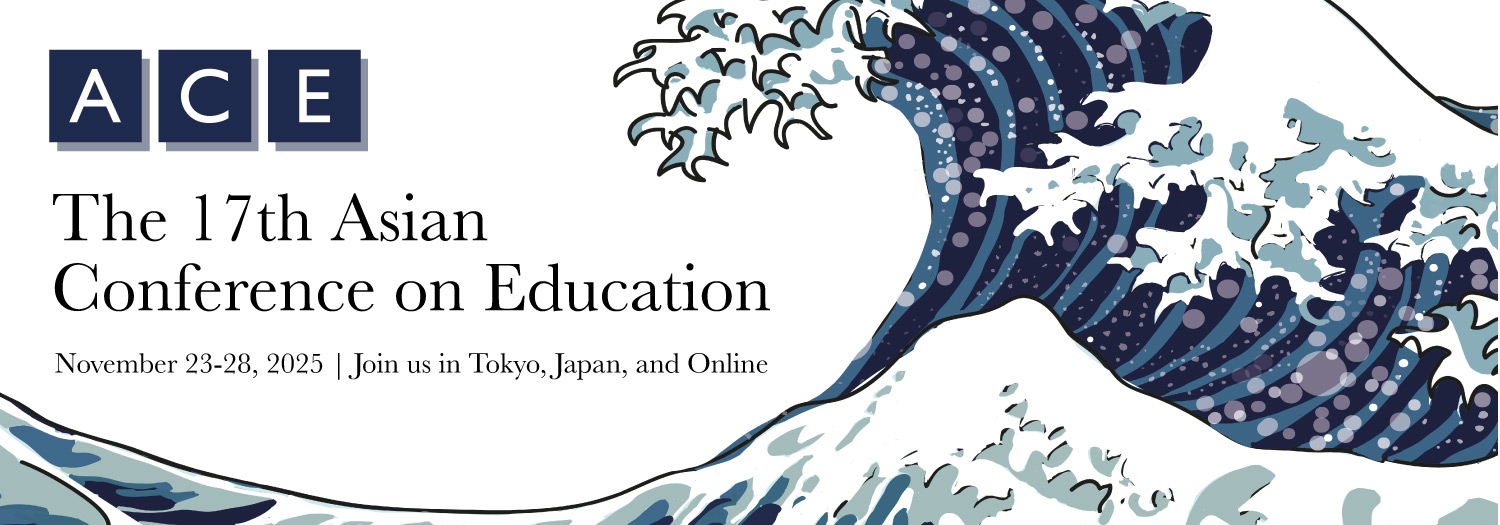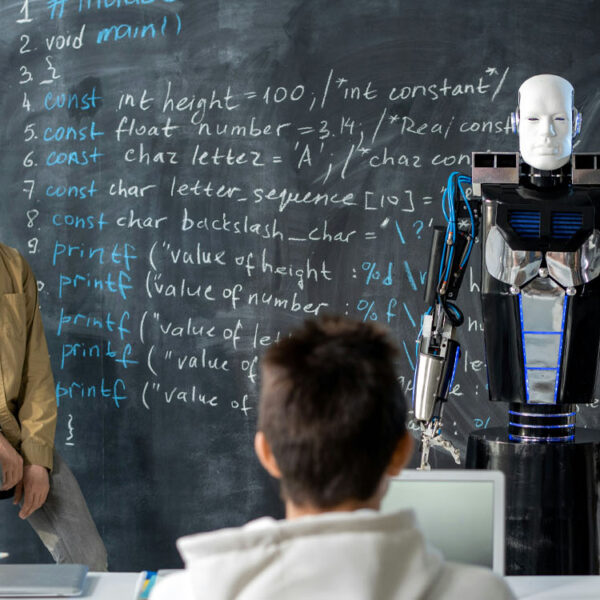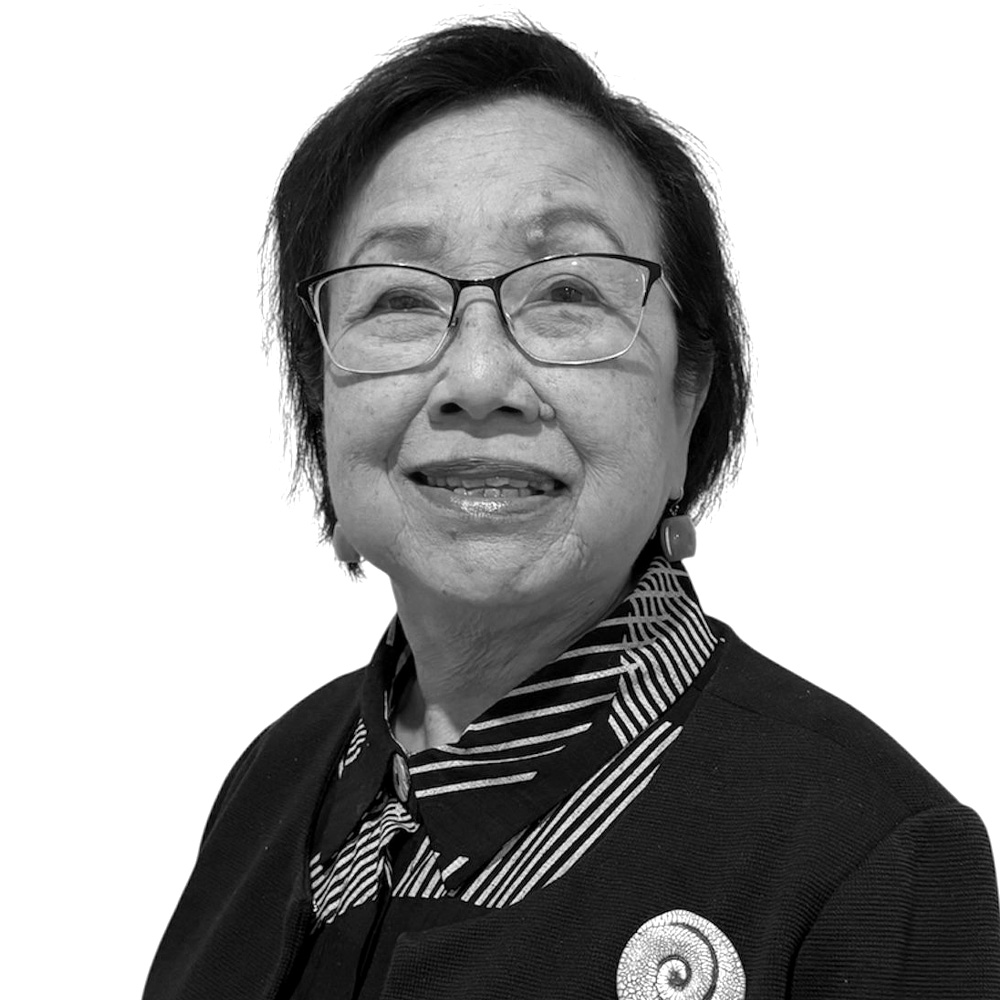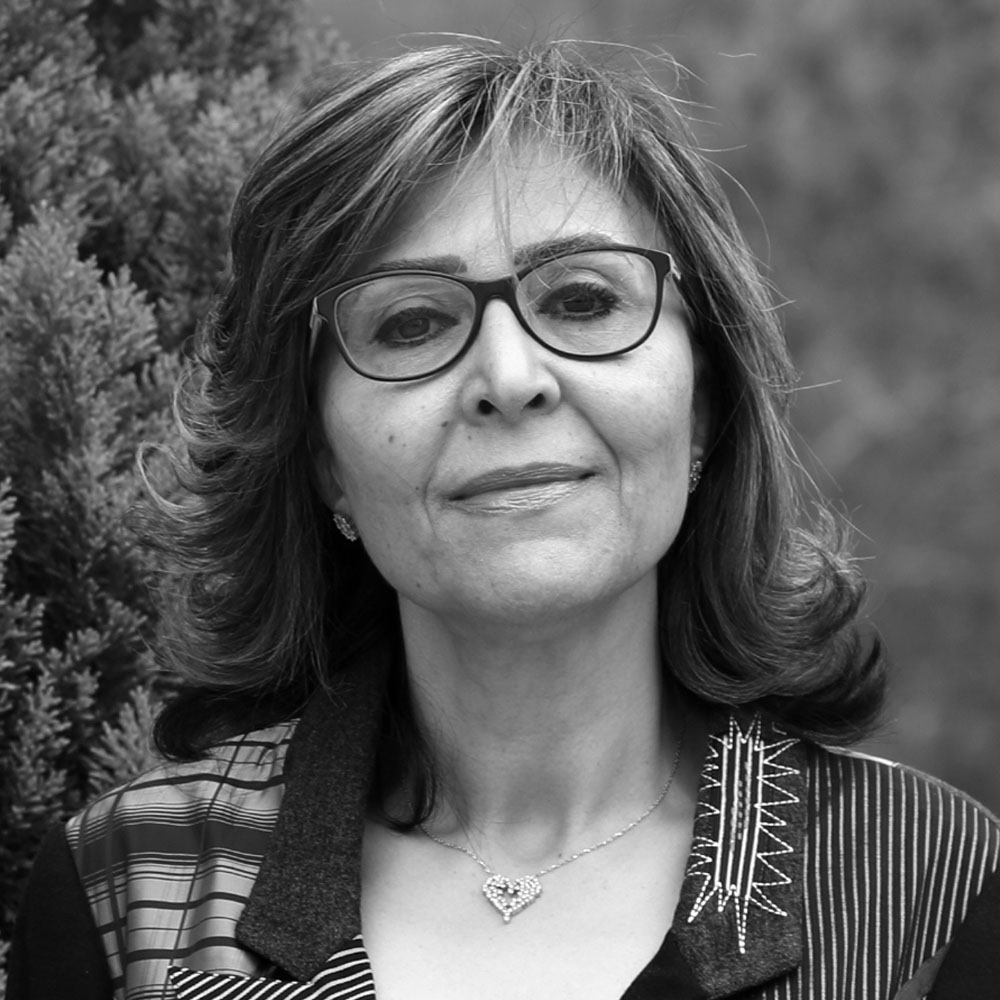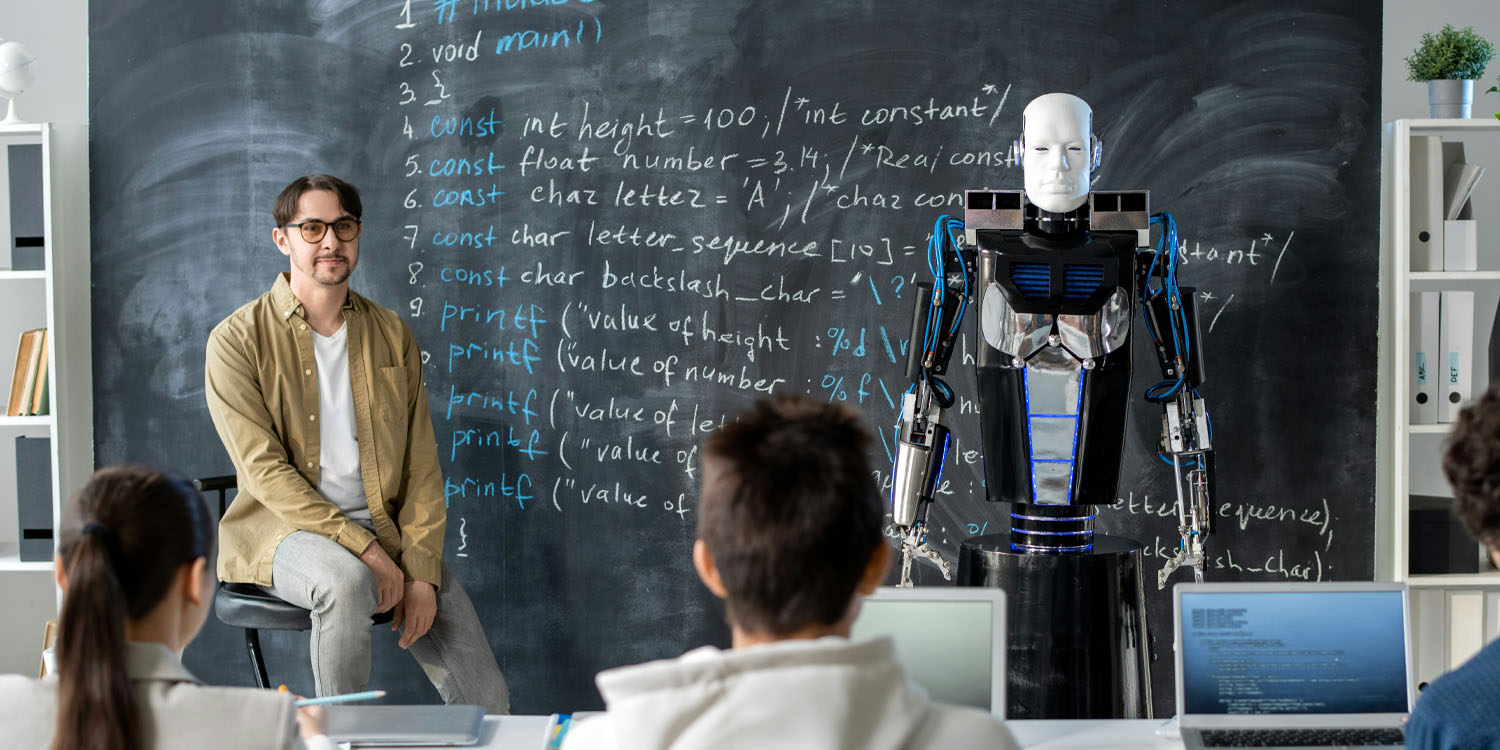Conference Outline
18:00-20:00: Welcome Reception | The Public Red Akasaka
This is a free event open to all registered delegates.
Join fellow delegates for a drink or two at the conference Welcome Reception. This event provides a great opportunity for delegates to network and get to know each other.
Conference Venue: Kioi Conference Center, Tokyo
09:30-10:30: Conference Check-in & Coffee | Foyer (4F)
10:30-11:00: Welcome Addresses & Recognition of IAFOR Scholarship Winners |
Grant Black, Chuo University, Japan
11:00-11:25: Keynote Presentation | Main Room (4F) & Online
Kan Suzuki, The University of Tokyo, Japan
11:25-11:40: Q&A
11:45-12:45: Panel Presentation | Main Room (4F) & Online
Internationalisation of Higher Education in East Asia: Challenges and Opportunities in Comparative Perspective
12:45-12:55: Conference Photograph
12:55-14:15: Extended Break
14:15-14:40: Keynote Presentation | Main Room (4F) & Online
Educational Leadership in the Age of AI Agents
Eric Hawkinson, Kyoto University of Foreign Studies, Japan
14:40-14:55: Q&A
14:55-15:55: Panel Presentation | Main Room (4F) & Online
Justin Sanders, Woven by Toyota, Japan (Moderator)
Conference Venue: Toshi Center Hotel, Tokyo
09:00-09:15: Conference Check-in | Subaru Room (5F)
09:15-10:00: Information Session | Orion Hall (5F)
Matthew Chima, IAFOR, Japan
Melina Neophytou, IAFOR, Japan
10:05-11:05: The Forum | Orion Hall (5F)
Sean McMinn, The Hong Kong University of Science and Technology, Hong Kong (Respondent)
Melina Neophytou, IAFOR, Japan (Moderator)
11:05-11:35: Networking Coffee Break
11:35-12:35: Japanese Cultural Presentation: Shamisen | Orion Hall (5F)
12:35-14:00: Extended Break
14:00-15:00: Afternoon Session 1
Conference Poster Session 1 | Orion Hall (5F)
IAFOR Undergraduate Research Symposium (IURS) Poster Session 1 | Subaru Room (5F)
15:00-15:30: Networking Coffee Break
15:30-16:30: Afternoon Session 2
Conference Poster Session 2 | Orion Hall (5F)
IAFOR Undergraduate Research Symposium (IURS) Poster Session 2 | Subaru Room (5F)
19:00-21:00: Conference Dinner | Shunju Tameikesanno
This is a ticketed event.
Conference Venue: Toshi Center Hotel, Tokyo
09:00-09:30: Conference Check-in & Coffee (6F)
09:30-11:10: Onsite Parallel Session 1
Room 601 (6F): Challenging and Preserving: Culture, Inter/Multiculturalism and Language
Room 603 (6F): Innovative Technologies in Education
Room 604 (6F): Higher Education
Room 605 (6F): Educational Policy, Leadership, Management and Administration
Room 607 (6F): Education, Sustainability and Society
Room 608 (6F): Educational Policy, Curriculum Design and Development
Room 702 (7F): Education and Difference
Room 703 (7F): Professional Training, Development and Concerns in Education
Room 704 (7F): Assessment Theories and Methodologies
Room 705 (7F): Art and Design in Education
Room 707 (7F): AI in Education
Room 708 (7F): Foreign Languages Education and Applied Linguistics
11:10-11:25: Break
11:25-12:40: Onsite Parallel Session 2
Room 601 (6F): AI in Education (Workshop)
Room 603 (6F): Innovative Technologies in Education
Room 604 (6F): Higher Education
Room 605 (6F): Educational Policy, Differences in Higher Education
Room 607 (6F): Education, Sustainability and Society
Room 608 (6F): Educational Policy, Leadership, Management and Administration
Room 702 (7F): Education and Difference
Room 703 (7F): Professional Training, Development and Concerns in Education
Room 704 (7F): Teacher Education
Room 705 (7F): Curriculum Design and Development
Room 707 (7F): Architecture and Engineering Education
Room 708 (7F): Foreign Languages Education and Applied Linguistics
12:40-13:40: Extended Break
13:40-15:20: Onsite Parallel Session 3
Room 601 (6F): Learning Experience, Student Learning and Learner Diversity (Workshops)
Room 603 (6F): Innovative Technologies in Education
Room 604 (6F): International Education
Room 605 (6F): Educational Policy, Leadership, Management and Administration
Room 607 (6F): Education, Sustainability and Society
Room 608 (6F): Educational Policy, Leadership, Management and Administration
Room 702 (7F): Mind, Brain and Psychology
Room 703 (7F): Professional Training, Development and Concerns in Education
Room 704 (7F): Adult, Lifelong and Distance Learning
Room 705 (7F): Curriculum Design, Counselling and Adjustments in Education
Room 707 (7F): AI in Education
Room 708 (7F): Foreign Languages Education and Applied Linguistics
15:20-15:35: Coffee Break
15:35-17:15: Onsite Parallel Session 4
Room 601 (6F): Teaching Experiences, Pedagogy, Practice and Praxis (Workshops)
Room 603 (6F): Innovative Technologies in Education
Room 604 (6F): Higher Education
Room 605 (6F): Educational Policy, Leadership, Management and Administration
Room 607 (6F): Education, Sustainability and Society
Room 608 (6F): Educational Policy, Leadership, Management and Administration
Room 702 (7F): Education and Difference
Room 703 (7F): Professional Training, Development and Concerns in Education
Room 704 (7F): Adult, Lifelong and Distance Learning
Room 705 (7F): Intercultural and Multicultural Education
Room 707 (7F): Education for STEAM
Room 708 (7F): Foreign Languages Education and Applied Linguistics
17:15-17:30: Coffee Break
17:30-18:45: Onsite Parallel Session 5
Room 603 (6F): Innovative Technologies in Education
Room 604 (6F): Higher Education
Room 605 (6F): Educational Policy, Leadership, Management and Administration
Room 607 (6F): Education, Sustainability and Society
Room 702 (7F): Innovative Technologies in Education
Room 703 (7F): Primary Education
Room 704 (7F): Teacher Education
Room 705 (7F): Curriculum Design and Development
Room 707 (7F): Career Education
Conference Venue: Toshi Center Hotel, Tokyo
08:30-09:00: Conference Check-in & Coffee
09:00-10:40: Onsite Parallel Session 1
Room 601 (6F): International Education
Room 603 (6F): Higher Education
Room 604 (6F): Early Childhood Care and Education
Room 605 (6F): Language Learning and Multilingual Education
Room 607 (6F): Design and Implementation of Educational Policy
Room 608 (6F): Education Research and Development in Higher Education
Room 702 (7F): Adolescent and Adult Education
Room 703 (7F): Learning Experiences, Student Learning and Learner Diversity
Room 704 (7F): Technical-Vocational and Entrepreneurship Education
Room 705 (7F): Foreign Language Education and Applied Linguistics
Room 707 (7F): Innovative Technologies in Education
Room 708 (7F): Education, Sustainability and Society
10:40-10:55: Coffee Break
10:55-12:10: Onsite Parallel Session 2
Room 603 (6F): Higher Education
Room 604 (6F): Professional Training, Development and Concerns in Education
Room 605 (6F): Service Learning
Room 607 (6F): Educational Policy, Leadership, Management and Administration
Room 608 (6F): Higher Education
Room 703 (7F): Adult and Special Education
Room 704 (7F): Knowledge Creation, Preservation and Access
Room 705 (7F): Gender Issues in Education
Room 707 (7F): Innovative Technologies in Education
Room 708 (7F): Educational Policy, Leadership, Management and Administration
12:10-13:10: Coffee Break
13:10-14:50: Onsite Parallel Session 3
Room 601 (6F): Assessment Theories and Methodologies
Room 603 (6F): Higher Education
Room 604 (6F): Social Studies and Citizenship Education
Room 605 (6F): Language Learning and Multilingual Education
Room 607 (6F): Innovative Technologies in Education
Room 608 (6F): Education Research and Development in Higher Education
Room 703 (7F): Learning Experiences, Student Learning and Learner Diversity
Room 704 (7F): Education for STEAM
Room 705 (7F): Foreign Language Education and Applied Linguistics
Room 707 (7F): Innovative Technologies in Education
Room 708 (7F): Special Topics in Education
14:50-15:05: Coffee Break
15:05-16:45: Onsite Parallel Session 4
Room 601 (6F): Higher Education
Room 603 (6F): Higher Education
Room 604 (6F): Professional Training, Development and Concerns in Education
Room 605 (6F): Language Learning and Multilingual Education
Room 607 (6F): AI in Education
Room 608 (6F): Higher Education
Room 703 (7F): Learning Experiences, Student Learning and Learner Diversity
Room 704 (7F): Education for STEAM
Room 705 (7F): Art and Design in Education
Room 707 (7F): Innovative Technologies in Education
Room 708 (7F): Educational Policy, Leadership, Management and Administration
16:45-17:00: Onsite Closing Session | Room 601 (6F)
Conference Venue: Online via Zoom
09:55-10:00: Message from IAFOR
10:00-11:00: The Forum
Apipol Sae-tung, IAFOR, Japan (Moderator)
11:05-12:05: Panel Discussion
Human-AI Partnership in Teacher Education: Rethinking the Hybrid Teacher of the Future
Nabila Nindya Alifia Putri, Universitas Islam Internasional Indonesia, Indonesia
Danny Liu, University of Sydney, Australia
Jason Lodge, University of Queensland, Australia
Susie Kung, Manukau Institute of Technology, New Zealand (Moderator)
12:15-13:55: Online Parallel Session 1
Live-Stream Room 1: Higher Education
Live-Stream Room 2: Learning Experiences, Student Learning and Learner Diversity
Live-Stream Room 3: Foreign Languages Education and Applied Linguistics
Live-Stream Room 4: AI in Education
Live-Stream Room 5: Innovative Technologies in Education
Live-Stream Room 6: Intercultural and International Education
Live-Stream Room 7: Professional Training, Development and Concerns in Education
13:55-14:05: Break
14:05-15:45: Online Parallel Session 2
Live-Stream Room 1: Higher Education
Live-Stream Room 2: Curriculum Development and Educational Leadership
Live-Stream Room 3: Foreign Languages Education and Applied Linguistics
Live-Stream Room 4: AI in Education
Live-Stream Room 5: Innovative Technologies in Education
Live-Stream Room 6: Intercultural and International Education
Live-Stream Room 7: Professional Training, Development and Concerns in Education
15:45-15:55: Break
15:55-17:35: Online Parallel Session 3
Live-Stream Room 1: Higher Education
Live-Stream Room 2: Special Topics: Alternative Education and TVET
Live-Stream Room 3: Foreign Languages Education and Applied Linguistics
Live-Stream Room 4: AI and Emerging Learning Modalities
Live-Stream Room 5: AI and Digital Literacy
Live-Stream Room 6: Education, Sustainability and Society
Live-Stream Room 7: Teacher Education
17:35-17:45: Break
17:45-18:45: Panel Discussion
Teaching Leadership Through Artificial Intelligence
Najwa Saba 'Ayon Fares, Rafik Hariri University, Lebanon
Mikel Garant, University of Helsinki, Finland
Martin Parsons, Hannan University, Osaka, Japan
Murielle El Hajj Nahas, Lusail University, Qatar (Moderator)
18:45-18:55: Closing Message from IAFOR
Conference Programme & Abstract Book
The draft version of the Conference Programme will be available online on October 13, 2025. All registered delegates will be notified of this publication by email. The Conference Programme contains access information, session information and a detailed day-to-day presentation schedule.
*Please be aware that the above schedule may be subject to change.
Important Information Emails
All registered attendees will receive an Important Information email and updates in the run-up to the conference. Please check your email inbox for something from "iafor.org". If you can not find these emails in your normal inbox, it is worth checking in your spam or junk mail folders as many programs filter out emails this way. If these did end up in one of these folders, please add the address to your acceptable senders' folder by whatever method your email program can do this.
Featured Speakers
-
Grant BlackChuo University, Japan
-
Mikel GarantCity University of Macau, Macau
-
Eric HawkinsonKyoto University of Foreign Studies, Japan
-
Susie KungManukau Institute of Technology, New Zealand
-
Nabila Nindya Alifia PutriUniversitas Islam Internasional Indonesia, Indonesia
-
Danny LiuUniversity of Sydney, Australia
-
Sean McMinnThe Hong Kong University of Science and Technology (HKUST), Hong Kong
-
Murielle El Hajj NahasLusail University, Qatar
-
Martin ParsonsHannan University, Japan
-
Najwa Saba ‘AyonRafik Hariri University, Lebanon
Featured Presentations
-
Educational Leadership in the Age of AI AgentsKeynote Presentation: Eric Hawkinson
-
Human-AI Partnership in Teacher Education: Rethinking the Hybrid Teacher of the FuturePanel Presentation (Online): Susie Kung
-
Teaching Leadership Through Artificial IntelligencePanel Presentation (Online): Najwa Saba ‘Ayon, Mikel Garant, Martin Parsons, Murielle El Hajj Nahas
Accepted Presentations
One of the greatest strengths of IAFOR’s international conferences is their international and intercultural diversity.
As of September 20, 2025, ACE2025 has received over 1,640 submissions from 92 countries and territories - including: Australia, China, India, Indonesia, Japan, Malaysia, Philippines, Singapore, South Korea, Taiwan, Thailand, United Arab Emirates, United Kingdom, United States, and Vietnam.
Previous Programming
View details of programming for past ACE conferences via the links below.
